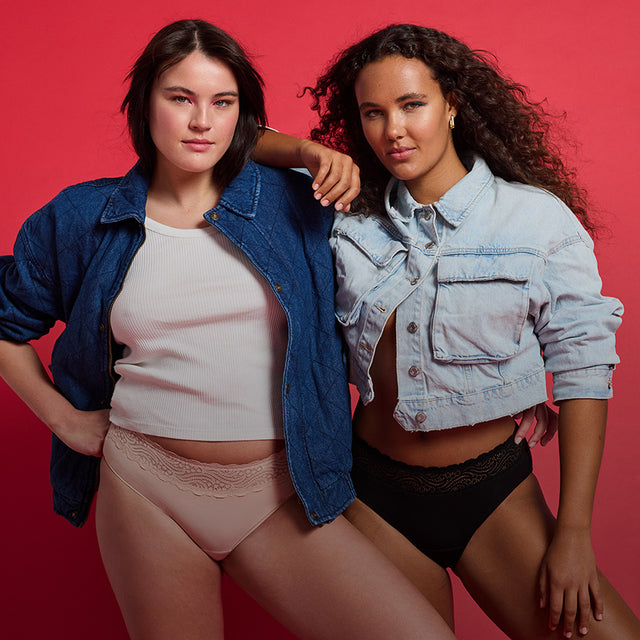Modibodi believes that everyone should experience their period without shame or having to worry about access to menstrual products.
Unfortunately, far too many people who menstruate struggle to afford adequate period products when their time of the month comes around; one in five Australians, two in five Americans, and one in four New Zealanders struggled to afford period products in the last year.
Part of Modibodi’s ethos is to strive for period equity. This means that anyone who menstruates has adequate access to period products, menstrual health education, and infrastructure to clean and change.
This month, we sat down with four amazing individuals who are fighting for greater period equity and challenging menstruation taboos within their Indigenous Australian, Māori, and Native Hawai’ian communities.
Check out some of the highlights from our panel below or watch the full discussion at the end.
First Nations leaders, academics and member of the community have been fighting for increased period equity while simultaneously reclaiming and revitalizing their culture and spaces.
One of the biggest challenges has been tackling the stigma surrounding periods, a concept believed to have been introduced by colonising forces.
“When I think back to the chants, when I think back to our stories, when I think back to our language, and I think of the different words that are associated with menstruation – I don’t have evidence of stigma,” remarks Mehanaokala “Mehana” Hind, a cultural educator and the Senior Vice President of Community Programs at the Council for Native Hawai’ian Advancement.
“We don’t have that evidence of stigma – until words start to get translated by other peoples who have imposed different realities and goals on these practices, and these ways of being female.”
Indigenous businesswoman and co-founder of Women on Country, Minnie King, echoed this sentiment. King’s understanding was that periods were once celebrated as a coming of age amongst many Indigenous Australian communities, as it symbolized a biological step forward in life.
Across many cultures, a girl’s first period would be celebrated as a communal event with feasting and ceremonies. Menstruation was considered by some to be a time of great spiritual power.
Today, menstruation is widely regarded as “women’s business,” not to be spoken about or experience openly – especially in the presence of men.
The decolonization of attitudes towards menstruation, however, could prove to be a vital component in achieving period equity within First Nation communities. In other words, de-coupling menstruation from its association with shame and secrecy.
This is a central component in Dr. Shiloh Groot’s work. A Māori researcher and interdisciplinary social scientist working in community psychology at the University of Auckland, Groot led a small-scale research project that explored the prevalence and impacts of period poverty in young people in Aotearoa New Zealand.
“You see this in a lot of young people trying to do that now around period poverty by embracing our cultural practices – which is so beautiful to see and to embrace that as a strength and to decolonise those assumptions of shame and stigma and uncleanliness. Those are powerful ways of healing some of the issues there that indigenous people are facing around the world.”
But stigma around periods isn’t the only problem; for many, accessing period products remains an issue.
Countries like the United States, United Kingdom and Australia have made inroads by starting to offer period products in select schools. Groot aptly points out, however, that there is still quite a long way to go as these policies overlook menstruators who are not in school.
Very few countries have made notable progress in addressing period equity outside of the classroom. There have been even fewer policies enacted that address the broader societal inequities negatively impacting First Nations communities - which can manifest as higher rates of period inequity.
Dr. Nina Lansbury, who researches on Indigenous health and water, sanitation and hygiene (WASH) in remote Indigenous communities at The University of Queensland, believes that things are starting to change for the better in this respect.
The recent Queensland Human Rights Act of 2019 is one such example of change, Lansbury argues. It states that access to healthcare without discrimination was a human right, referencing the history of discrimination and inequities experienced by Indigenous Australians within the healthcare system.
Rarely is menstruation care regarded as healthcare, however, save for cases of menstrual disorders.
Even so, King believes that access to information and education on menstrual health – for both men and women, boy and girls – is integral to improving community health outcomes.
“To have thirty-odd years of menstruation - that's a huge chunk of your life, especially if you’re Indigenous in this country, where the life expectancy is so, so short compared to a non-Indigenous person. Generally, for your adult life, you’ll have your period almost to the end.”
Progress towards period equity has been a slow burn, but as Hind points out “the most important thing is that the conversation has started.”
“We have a lot of work to do. But I am more inspired now than I was five years ago, than I was ten years ago. Definitely more than when I was a young child experiencing this transition and starting to face a lot of the issues we’ve come up with. So, it’s a great time right now to be in!”







